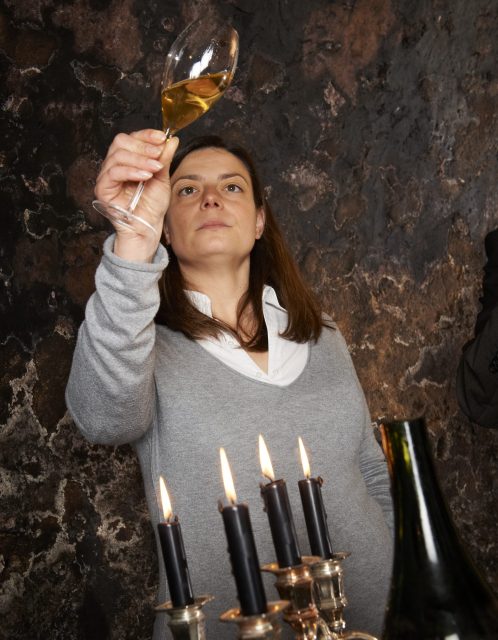This website uses cookies so that we can provide you with the best user experience possible. Cookie information is stored in your browser and performs functions such as recognising you when you return to our website and helping our team to understand which sections of the website you find most interesting and useful.
Master Winemakers Top 100: Stéphanie Sucheyre
Stéphanie Sucheyre, cellar master at Champagne Gardet, features as one of our top 100 winemakers and winner of the Best Newcomer award. She speaks to db about tending to individual vats, pairing Champagne with scallops and the appeal of tea at the end of the day.

Stéphanie Sucheyre grew up in a world of viti- and viniculture: her father was an advisor in viticulture and oenology at the Auvergne Chamber of Agriculture, and her grandfather made wine. When the time came for her to decide on a career, she built a strong foundation with studies in Burgundy, Montpellier and finally Reims. In 2007, Sucheyre joined Champagne Gardet before stepping into the role of chef de cave a year later.
Her Champagne Gardet Extra Brut 2013 won a Master medal at the Champagne Masters 2023. As a new entrant to the Global Wine Masters series, she was also selected to receive the Best Newcomer award.
Describe your winemaking approach in no more than three words.
Reasoned; intuitive; pragmatic.
What’s your favourite part of the job?
The great thing about being an oenologist is that I appreciate all the stages of creating Champagnes. But my favourite period is from harvest to bottling. I love all the effervescence that is created at harvest time and that feeling of unity throughout the region. Then there’s the more secret, but just as intense, first fermentation and the supervision of each vat right through to blending and finally bottling, the work of creating each cuvée. Every action has an impact on the future balance of the wine.
Which aspect of the job keeps you awake at night?
As already noted, each action has a consequence for the future balance of the wine. Perhaps it is this responsibility of having the future of our crop in my hands, and therefore the duty and the desire never to make a mistake, that can keep me awake. The secret is to learn to let go, to concentrate on the moment and what’s important.
What’s your go-to drink at the end of a long day?
I like a good aromatic tea to fully relax at the end of a good day. But when I’m in a more nostalgic mood and it’s winter, I’m happy to pour a flute of our Selected Reserve in my favourite armchair by the fire.
What’s the best piece of advice you’ve ever been given?
The best advice I have ever received is not to pay attention to other people’s comments, which may be kind but can sometimes be a barrier. Also, to always go for it and give everything you’ve got to achieve your goal.
What was your greatest winemaking mistake?
I once wanted to block malolactic fermentation for the Prestige Charles Gardet Rosé de Saignée, 2010 vintage, in a bid to retain only the fruit and improve ageing. Unfortunately, the attempt was not successful and we ultimately decided not to bottle this Rosé de Saignée vintage.
What’s the most important winemaking lesson you’ve learned so far?
The most important lesson I’ve learned is that there are no absolute rules when it comes to winemaking. What works in one vat will not have the same effect in another. Ultimately, there is no magic recipe; you have to work meticulously on every detail.
Which figure outside the world of wine inspires you?
Simone Veil, for the whole of her life and her battles.
Where would your fantasy vineyard be?
My (not so imaginary) vineyard would be in The Shire, the county in The Lord of the Rings. The landscapes and vineyard regions of New Zealand are incredible and majestic.
If you weren’t a winemaker, what would you be doing and why?
I would have loved to become a “nose” for perfume creation. This complex world appeals to me enormously, and you need an extraordinary olfactory memory and a lot of creativity. But I would miss the gustatory dimension, which is why I preferred to go into oenology, which offers me a complete sensory universe.
What’s the most memorable food match you’ve had with one of your wines?
One Christmas when I opened a 2005 vintage of our Charles Gardet Prestige after a long time in the cellar. I was surprised by the freshness and deliciousness of the wine, which went perfectly with the scallop carpaccio drizzled with citrus fruit that we were sharing with my family and friends.
What role does sustainability have to play in a Master-winning wine?
The vine – like all crops – is directly affected by environmental damage. It therefore makes sense, as part of our business, to pay particular attention to our own impact on the environment.
Which type of wine do you drink most regularly?
Champagne! Particularly our Gardet Blanc de Noirs because I find it’s the perfect accompaniment to any good time. It’s an all-rounder in the best sense of the word.
Your home is on fire: which bottle do you save?
A magnum of Gardet Extra Brut Vintage, bien sûr!

What are your top three markets and importers?
Japan (Liquor Mountain)
UK (House of Townend)
USA (P Comms Intl)
And which market would you most like to enter?
Switzerland.
Related news
Glenfiddich becomes official partner of Aston Martin F1 team
Spain 'needs to learn how to market our fine wines', producer claims
Bourgogne wine see global growth despite difficult market conditions

